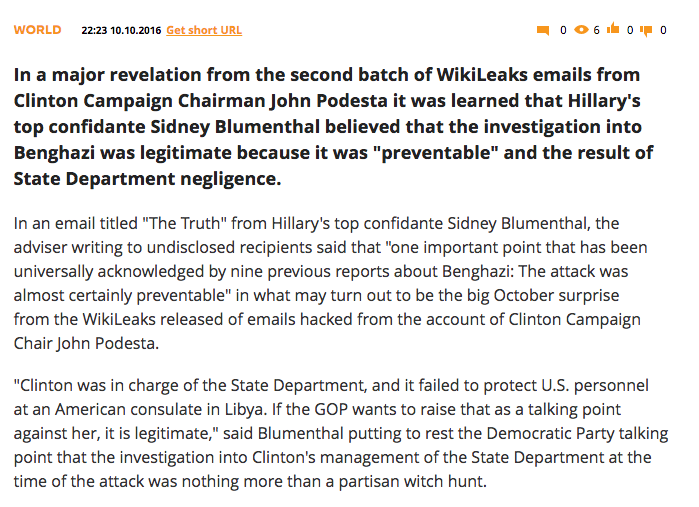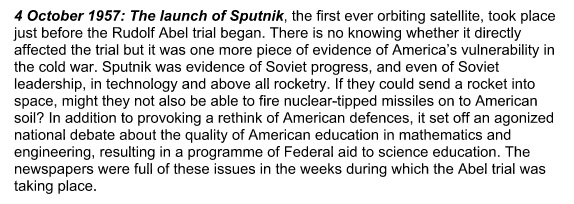Trump quotes Russian misinformation while mistakenly citing Clinton adviser
Evidence continues to mount that Russia is playing a significant role in the US election.
At a campaign rally in Pennsylvania on 10 October, Donald Trump read out quotes from a Newsweek article mistakenly thinking they came from Hillary Clinton adviser Sidney Blumenthal.
As evidence continues to mount that Russia is playing a significant role in the US election, it appears the quotes passed through the information filter of Russian online news and radio service Sputnik – a subsidiary of Russian government owned and operated news agency Rossiya Segodnya.
The story on Sputnik has since been taken down. It originated from a slew of 2,000 Clinton emails released by Wikileaks on October 7. One titled "The Truth..." sent by Blumenthal last year to "undisclosed-recipients" copies wholesale an article by Newsweek journalist Kurt Eichenwald about Benghazi.
The Sputnik article falsely quotes Blumenthal, stating he wrote in the email that the attack was "almost certainly preventable" and that Clinton "failed to protect U.S. personnel at an American consulate in Libya." These were, rather, the words of Eichenwald. The Newsweek brand is owned by IBTimes UK parent company IBT Media.
In a speech in Wilkes-Barre, Pennsylvania, Monday, Trump quoted from what appears to be the Sputnik article. "This just came out a little while ago," he said of the story, stating "this is Sidney Blumenthal" before beginning to quote. Trump did not cite the source of the article in his speech before tossing the paper he read from the podium.
Trump said that the email was tantamount to an admission "that they could have done something about Benghazi." This drew a chorus of 'boos' from the audience.
In a response, Eichenwald points out the irony that his piece has been used this way, since it's "about the obscene politicisation of the assault that killed four Americans" and "slammed the Republican Benghazi committee which was engaged in a political show trial disguised as a Congressional investigation."
Jon Passantino, deputy news director at BuzzFeed News, dissected the timeline of the Sputnik article and suggests Trump could have been reading a tweet that appeared from an anonymous pro-Trump account that appeared at 8:28 am on Monday.
Re the Newsweek story, how do we know Trump was reading Sputnik story & not this viral tweet with thousands of RTs?https://t.co/Cq1lTj2PPO
— Jon Passantino (@passantino) October 11, 2016
The Sputnik article was first published and timestamped at 10:23 pm Moscow time, since the news organisation's servers are based there. The time difference is seven hours between Pennsylvania and Moscow, so the article would have appeared at 3pm US time. Trump took the podium more than two hours after the Wilkes-Barre event began at 6pm. When he addressed the email, Trump said "this just came out a little while ago."
The original Blumenthal email and others were released October 7, the same day that the US issued a joint statement from the Department of Homeland Security and Office of the Director of National Intelligence blaming Russia for hacking the Democratic National Committee, as well as the email accounts of figures like former Secretary of State, Colin Powell.
"We are not now in a position to attribute this activity to the Russian Government," the statement said. "Russians have used similar tactics and techniques across Europe and Eurasia," it continued, noting that "only Russia's senior-most officials could have authorized these activities."
Just days later, on Sunday, October 9, Russian Foreign Minister Sergei Lavrov told Russian state TV's First Channel that "we have witnessed a fundamental change of circumstances when it comes to the aggressive Russophobia that now lies at the heart of U.S. policy towards Russia.
"It's not just a rhetorical Russophobia, but aggressive steps that really hurt our national interests and pose a threat to our security."



© Copyright IBTimes 2024. All rights reserved.






